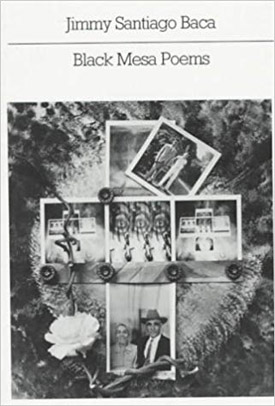 Jimmy Santiago Baca was born in Santa Fe, New Mexico, in 1952 and abandoned by his parents when he was two years old. After living with one of his grandparents for several years, he was placed in an orphanage and wound up living on the streets. At the age of 21, he was convicted of drug possession and sent to prison for six years, four of which were spent in isolation. During this time, he taught himself to read and write and began to make poems. Denise Levertov, the editor of Mother Jones magazine at the time, accepted some of his poems for publication and eventually found a publisher for his first book.
Jimmy Santiago Baca was born in Santa Fe, New Mexico, in 1952 and abandoned by his parents when he was two years old. After living with one of his grandparents for several years, he was placed in an orphanage and wound up living on the streets. At the age of 21, he was convicted of drug possession and sent to prison for six years, four of which were spent in isolation. During this time, he taught himself to read and write and began to make poems. Denise Levertov, the editor of Mother Jones magazine at the time, accepted some of his poems for publication and eventually found a publisher for his first book.
Baca is one of those rare poets whose work is immediately accessible and yet indefinably rich, dense and profound. His diction is seemingly very basic and direct, but he maintains the ability to shift from the mundane to the magical in a phrase, making his everyday life into a lens that examines events with no pity, but with a great deal of compassion and love.
Black Mesa Poems is a jewel – it is personal, intimate, and at the same time as large in vision as the Southwest that is Baca’s home. In “Dream Come Early,” the first poem in the book, Baca talks about a house that he and his wife bought, more than they could afford, but
where as a girl
she watched Gene Autry, and fell asleep
to moons of brass doorknobs,
flagstone steps, thick bluish glasspanes,
hardwood floors,swirling in the vortex with her
two thousand miles away,
I watched Zorroached for a farm.
And later:
house full of kind spirits, whose
blossoms fountainin long fringed leggings of buffalo dancers
at each window, . . .
The miracle here is that Baca draws together the threads of three traditions – Chicano, southwest Native, and Anglo – into a beautiful, shimmering fabric of words, and does so seemingly effortlessly.
These are also pictures of a man who has arrived at a certain peace in his life, from learning, finally, what’s important, and who has a good sense of when he’s been out of line. Later in “Dream Come Early,” relating a confrontation in which he was wounded by a man who shot his steer, and who had never been a friend:
Following morning calls came,
“Tell us who did it Gato!”
“Our rifles are loaded!”I said, “Leave it alone. What would you do
if a drunk man came into your yard
and threatened to beat you?”
And it’s not all so serious. In “Since You’ve Come,” a poem to his son, he gives humorous play to the demands of an infant, casting Antonio as “a bored prince” and “our emperor,” and closing
and after all of it,you simply
shut your eyes, burp, and go to sleep.
We have never loved anyone more than you,
my child.
These are poems by a man who understands that to be a true poet, a curandero of the soul, you must first accept the world and all that’s in it – and then you must love it.
A good, strong mix of longer and shorter works, Black Mesa Poems is a treasure.
(New Directions, 1989)
